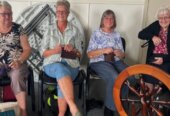
Christine Bryant, Lay Minister, St John’s.
When is Science not Science?
Recently there have been references to a new Science curriculum for Years 1-10. Three main areas of focus have been mooted: Sustainability, Climate Change and Infectious Diseases. So far, I have seen no mention of the three traditional branches of Science: Biology, Chemistry and Physics – the three which have for centuries underpinned our learning about the universe. Can you, in fact, imagine Science without the Periodic Table, Litmus Tests or chemical reactions? Or without gravity, magnetism and forces? Of course not. So, why do we now consider it appropriate to deprive future students of the opportunity to learn these basic concepts, these building blocks, on which we base knowledge about life and our planet?
Sustainability, Climate Change and Infectious Diseases are important in today’s world, but they are subsets of the much broader concepts encompassed by Biology, Chemistry and Physics.
The “consultation” about the new Science curriculum is still to take place – at least, it is to be hoped that there will be a rigorous debate of the issues. However, it sits within much broader considerations such as What is wisdom? What is the purpose of education? Should learning be reduced to a “need to know” basis?
Science, from a Christian perspective, originates from the Bible – not a belief that the Bible is a book of fact /Science/History. It manifestly is not. Writers in Biblical times did not approach factual material as we do now when we have sophisticated tools of research to make it possible to test and prove hypotheses. Rather, one of the main ideas which courses through the Bible is from Psalm 111:10 : The fear of the Lord is the beginning of wisdom and they who live by this grow in understanding.
What is the fear of the Lord? It is not the sense of being scared or afraid, but being in awe of all that God has created around us and within us. It is contained also within the words of Psalm 8: When I see the works of thy fingers, the moon and the stars which you have set in place, what is man that you are mindful of him? … You have made him ruler over the works of your hands, …. All the flocks and herds and the beasts of the field, the birds of the air and the fish of the sea …
Surely it is the business of education to enable growth in understanding. There is no doubt a benefit to establishing a vegetable garden at pre-school, so children learn a little about how sunlight and water foster growth. However, at some point this beginning must morph into a serious study of photosynthesis, of why leaching nitrates into the soil is harmful, of why apples fall from trees. I am not persuaded that focusing on 3 narrow aspects will engage our students from Years 1-10. They are unlikely to become the new generation of researchers and engineers if they are not encouraged to enter the exciting world which is revealed in Biology, Chemistry and Physics.
O Lord, our Lord, how majestic is your name in all the earth!








